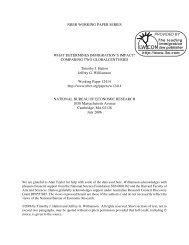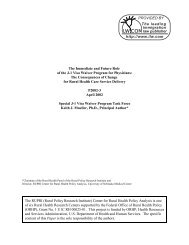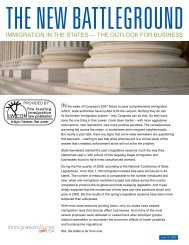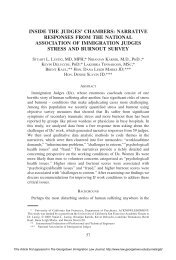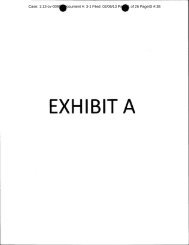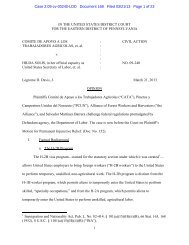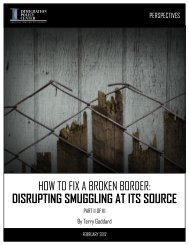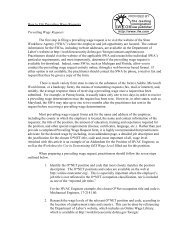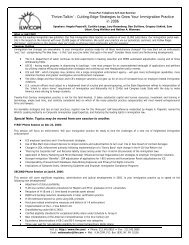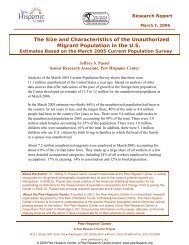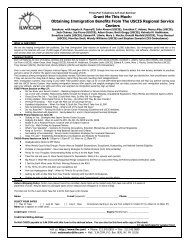Study of Board of Immigration Appeals Procedural Reforms - ILW.com
Study of Board of Immigration Appeals Procedural Reforms - ILW.com
Study of Board of Immigration Appeals Procedural Reforms - ILW.com
Create successful ePaper yourself
Turn your PDF publications into a flip-book with our unique Google optimized e-Paper software.
Public reaction to the “<strong>Procedural</strong> <strong>Reforms</strong>” has been expressed in a variety <strong>of</strong> forms —<br />
most notably, <strong>com</strong>ments submitted prior to the promulgation <strong>of</strong> the final rule and a lawsuit filed<br />
by the Capital Area Immigrants’ Rights Coalition (“CAIR”) and AILA.<br />
Comments<br />
The <strong>com</strong>ment period for submissions regarding the <strong>Procedural</strong> <strong>Reforms</strong>, as proposed on<br />
February 19, 2002, was 30 days. 118 During this time, the EOIR received 68 <strong>com</strong>ments. 119 Most<br />
<strong>com</strong>ments were strongly opposed to “many or most <strong>of</strong> the specific provisions <strong>of</strong> the proposed<br />
rule.” 120 Based upon these <strong>com</strong>ments, the EOIR did make some modifications to the final rule,<br />
but proceeded with the promulgation <strong>of</strong> the “<strong>Procedural</strong> <strong>Reforms</strong>” largely as proposed.<br />
Due Process<br />
Numerous <strong>com</strong>ments (both those in support <strong>of</strong> and those against) expressed concerns<br />
about the due process implications <strong>of</strong> the “<strong>Procedural</strong> <strong>Reforms</strong>.” 121 Some <strong>com</strong>ments expressed<br />
the concern that the “<strong>Procedural</strong> <strong>Reforms</strong>” emphasize production by members <strong>of</strong> the BIA to the<br />
detriment <strong>of</strong> quality and due process. Several <strong>com</strong>ments noted the lack <strong>of</strong> an internal review<br />
standard to assure quality, accuracy and consistency, as well as the incentive for members to<br />
“rubber stamp” decisions by <strong>Immigration</strong> Judges in order to handle their enormous caseloads<br />
within the time constraints imposed by the reforms. 122<br />
Several <strong>of</strong> the <strong>com</strong>ments submitted argued that the “<strong>Procedural</strong> <strong>Reforms</strong>” endangered a<br />
respondent’s right to due process under the Supreme Court’s balancing test in Mathews v.<br />
Eldridge. 123 As the EOIR noted, many <strong>com</strong>ments focused on one prong <strong>of</strong> this balancing test —<br />
the “nature <strong>of</strong> the interest <strong>of</strong> the individual, particularly in asylum and related cases where the<br />
respondents assert that the respondent will be persecuted, his or life or freedom will be<br />
threatened, or that he or she will be tortured, if returned to his or her country <strong>of</strong> origin.” 124 As<br />
Senators Edward Kennedy and Patrick Leahy wrote:<br />
The interests at stake are significant, especially for asylum seekers,<br />
who may face persecution or even death, and long-time residents,<br />
118 Proposed Rule, supra note 68, at 7310 (identifying March 21, 2002 as the deadline for submission <strong>of</strong> written <strong>com</strong>ments).<br />
119 Final Rule, supra note 40, at 54879 (noting that the EOIR received sixty-eight timely submissions and five untimely submissions).<br />
120 Id. at 54881.<br />
121 See, e.g., Letter from United States Representative George W. Gekas (Chairman, Sub<strong>com</strong>mittee on <strong>Immigration</strong> and Claims), to Mr.<br />
Charles Adkins-Blanch, General Counsel, EOIR, U.S. DOJ 3 (Mar. 21, 2002) [hereinafter Gekas Comments]; Letter from ACLU, to Mr.<br />
Charles Adkins-Blanch, General Counsel, EOIR, U.S. DOJ (Mar. 21, 2002) (opposing the proposed rules and urging that they be rescinded)<br />
[hereinafter ACLU Comments]; see also Final Rule, supra note 40, at 54881; Letter from United States Representatives John Conyers, Jr.<br />
(Ranking Member Committee on Judiciary) and Sheila Jackson Lee (Ranking Member Sub<strong>com</strong>mittee on <strong>Immigration</strong> and Claims) to Mr.<br />
Charles Adkins-Blanch, General Counsel, EOIR, U.S. DOJ 4 (Mar. 21, 2002) [hereinafter Conyers & Jackson Lee’s Comments].<br />
122 See, e.g., AILA Comments, supra note 69, at 8-9 (noting a “fear that <strong>Board</strong> Members would be forced to rubber-stamp IJ decisions without<br />
thorough and thoughtful review and analysis” due to the increased caseload and urging an increase, rather than a cut, in the size <strong>of</strong> the<br />
<strong>Board</strong>).<br />
123 424 U.S. 319, 341-47 (1976); see, e.g., Letter from the American Bar Association, to Mr. Charles Adkins-Blanch, General Counsel, EOIR,<br />
U.S. DOJ 7 (Mar. 18, 2002) [hereinafter ABA Comments]; see also AILA Comments, supra note 69, at 4-5.<br />
124 Final Rule, supra note 40, at 54881.<br />
26



